Behind closed doors
By Xing Wen | China Daily | Updated: 2021-03-12 08:57

Many of her female followers have been sending her messages about the problems they are facing in life or at work. And Qiao often posts the ones that represent the circumstances and experience of a large group of women, including blind dates, marriage, sexual harassment and reproduction, without leaking personal information of the senders.
Qiao says she can feel the rising of feminism from the women's stories told in the messages.
"Also, sharing the stories could spark wider discussion on the internet, which helps to inspire women who are facing or on the way to face similar problems to re-examine their circumstances and make a proper choice," she adds.
She says she believes that female readers could find an echo with the stories of Xia, the protagonist in her novel, Common Marriage.
Besides, the novel spans the decade from 2008 to 2018, a period that witnessed the decline of traditional news media-in the forms of newspapers, television and radio in China.
At the beginning of the story, Xia works as an intern reporter in 2008 for a Shanghai-based magazine that usually exposes relevant facts to the public where she forms a passion for investigative journalism. However, a year later, she chooses to go back to Nanjing, Jiangsu province, to get an editorial job with a local newspaper and then marries Fang. At the end of the story, she quits the job and starts to write scripts for documentaries.
The career path of the protagonist is similar to that of the author herself. Qiao studied journalism and communication at a Nanjing-based university and graduated in 2003. After a short internship with Life Week magazine, renowned for its in-depth reporting and commentary on social issues, she got a job as an editor for a local newspaper. In 2010, she moved to work in the film and television industry as a project planner.
Reflecting on her own work experience, she found that great changes had taken place in the mass media.
"Many media shut down print editions and published solely online. The traditional media sold less in the digital era, and reporting is no longer a job that is widely respected and trusted due for multiple reasons,"Qiao says.
The author says she wants to write about her observation of the changes in the novel and portray the diverse images of post-80s media workers who have experienced huge changes. This includes a financial reporter who later grows into a successful entrepreneur and a middle-aged editor who refuses to make innovative efforts to help the newspaper she works for to become more attractive but instead muddles along from day to day.
The image of a once renowned journalist who relishes undercover work to unveil matters that are deliberately hidden by someone in a position of power has also been shaped in the novel. As the traditional media declines, the journalist feels bewildered and depressed to see that gossip, rumor and hatred go viral on social media and people show less interest in digging out the facts.
Zhou Jianing, a fellow author and a translator, says that she's glad to have read the book written by an author of her age. And it's time to reflect on the changes the generation has experienced in the past decade.
"The book allows me to see the differences between the world in my eyes and how my contemporaries view it," she says.
























